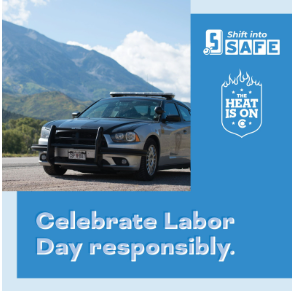Heightened DUI enforcement begins Friday
News Release
Una intensa campaña de DUI empieza el viernes en español
Statewide — Don’t miss out on backyard barbecues, time with friends and end-of-summer fun with a DUI — always plan a sober ride home. From Aug. 16 to Sept. 4, the Colorado Department of Transportation will support the Colorado State Patrol (CSP) and 70 local law enforcement agencies for The Heat Is On Labor Day Crackdown DUI enforcement period. During the 20-day enforcement period, drivers may see saturation patrols, sobriety checkpoints and additional law enforcement officers on duty dedicated to arresting impaired drivers.
Labor Day marks the end of the 100 Deadliest Days of Summer — the period between Memorial Day and Labor Day that historically sees a spike in fatal crashes. Since Memorial Day of this year, there have been nearly 1,400 crashes involving a suspected impaired driver in Colorado. In June and July alone, there were a combined 129 traffic fatalities in Colorado, 44 of which involved a suspected impaired driver.
“Impaired driving-related crashes, injuries and fatalities are entirely preventable. When you drive under the influence of drugs or alcohol, you are gambling with other people's lives,” said Col. Matthew C. Packard, chief of the Colorado State Patrol. “Your holiday weekend could quickly come to an end with a DUI, jail time or even a fatal crash. Keep your safety and that of others in mind — the only choice is a sober ride.”

Driving under the influence of any impairing substance — not just alcohol — is illegal. Most CSP troopers have specialized training in drug detection, known as ARIDE (Advanced Roadside Impaired Driving Enforcement). All Colorado law enforcement agencies can administer alcohol and drug toxicology tests to drivers following a fatal DUI crash. Additionally, there are over 120 Drug Recognition Experts (DRE) in Colorado trained to recognize impairment in drivers under the influence of drugs other than, or in addition to, alcohol.
“Long weekends are never an excuse to drive impaired,” said CDOT’s Office of Transportation Safety Director Darrell Lingk. “Last year’s Labor Day Crackdown enforcement period concluded with 774 reported DUI arrests. No one is above the law — the only way to avoid a DUI is by driving sober. It’s that simple. Enjoy the holiday responsibly by leaving the keys at home and planning a sober ride.”
For yearly impaired-driving crash and fatality data in Colorado, visit https://www.codot.gov/safety/traffic-safety/data-analysis/fatal-crash-data. For local law enforcement agency plans, visit https://www.codot.gov/safety/traffic-safety-reporting-portal.
DUI Checkpoint B-Roll
CDOT is making available new DUI checkpoint footage, available free for media use, offering a compelling glimpse of what happens during a checkpoint. The footage captures real-life interactions between law enforcement officers and drivers at DUI checkpoints, highlighting the consequences of impaired driving. You can find more about these photos on the CDIOT DUI Checkpoint B-Roll Google Drive Folder. Send email to [email protected] to request access to the folder.
Note: The people portrayed in the videos signed participation waivers to be included in filming.
About The Heat Is On
The Heat Is On campaign runs throughout the year, with 16 specific high-visibility impaired driving enforcement periods centered on national holidays and large public events. Enforcement periods can include sobriety checkpoints, saturation patrols and additional law enforcement on duty dedicated to impaired driving enforcement. Find more details about the campaign, including impaired driving enforcement plans, arrest totals and safety tips at HeatIsOnColorado.com. More information about DUI laws in Colorado can be found at NoDUIColorado.org. Learn more about CDOT’s dedication to keeping Colorado roads safe, including impaired driving enforcement objectives, arrest data and safety information at codot.gov/safety.
Crash Not Accident
Note to reporters: Crashes are no accident — they are preventable. We would appreciate you saying 'crash' instead of 'accident' when reporting.
